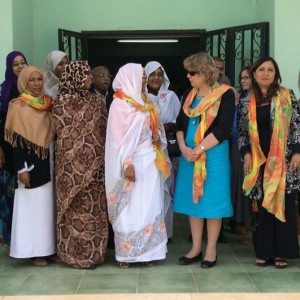12th March 2015
DFID Minister’s reflections on Sudan Visit
Guest blog by Baroness Northover, UK’s Parliamentary Under Secretary of State for International Development
I have just returned from Sudan, one of the first countries I have visited since my appointment as a minister in the UK Department for International Development (DFID).
I’m pleased to have visited Sudan so early in my job. We have a large DFID team in Khartoum who will oversee the provision of £46 million in humanitarian and development aid in 2015. Sudan and the UK have a long and shared history.
I am particularly committed to combating violence against women and girls. A highlight of my visit was a trip to a “Born Saleema” hospital in Kalakala, one of the government-run hospitals incorporating education against female genital cutting (FGC). And the Saleema campaign, supported by the UK, is succeeding, as shown by the growing number of communities who have pledged to abandon FGC.

Social norms are incredibly hard to change. These are beliefs, habits and customs ingrained over many generations. Yet through determination, social activism and support from the Government, elders and religious leaders, the Saleema campaigners are doing just that. All Sudanese can be proud of their work. And this leads me to think: if the Saleema model of inclusive dialogue and participatory social change can work for combating FGC then why not for other challenges faced by your country?
I do not underestimate the scale of those challenges. I travelled to El Geneina and visited two IDP camps where the UK is working with partners to assist civilians affected by conflict. As conflict continues so the humanitarian crisis deepens. The news of yet more violence and displacement in Darfur and South Kordofan is extremely disturbing. I am particularly concerned about the reported aerial bombardment and destruction of villages in Central Darfur State and the bombing of a MSF hospital in South Kordofan. I support the UN’s secretary general in calling for the Government and the armed opposition movements to exercise maximum restraint, without delay, and fully assume their responsibility to prevent further displacements and suffering of civilian populations and resume dialogue. I also urge the government to provide all necessary facilitation and access to organisations seeking to deliver humanitarian help to those in need. It is the ordinary people of Sudan in the conflict areas who suffer most. The UK will not forget them. In addition to recent contributions to the World Food Programme, I announced last week a further £7 million contribution to the Common Humanitarian Fund.
In my meetings with Government I was clear that there needs to be an end to conflict and violations of international law. We also need to see concrete actions in support of the commitment to national dialogue and poverty reduction and greater efforts to build a partnership with the UN. This will help not only to change Sudan but also to reset its relationship with the international community. We are equally clear with the armed opposition movements that they need to demonstrate a commitment to peaceful resolution of the issues facing Sudan.
We may not always agree but, as a close friend, the UK will always strive to be frank and supportive. The UK’s ties to Sudan are too strong and broad for us to pull back. We have more than doubled the number of prestigious Chevening scholarships offered to outstanding graduates in Sudan. The British Council delivered courses to some 3000 students in 2014 and has trained almost 4,500 teachers of English in 10 states, assisting over 200,000 children. We support the entrepreneurship competition, Mashrouy, which has been a huge hit on Blue Nile TV. We have trained over a hundred journalists and editors to strengthen the Sudanese media and improve transparency and accountability. And the hunger for UK culture was vividly demonstrated two weeks ago when the National Theatre in Omdurman overflowed with people eager to see Hamlet performed by London’s Globe Theatre!
I left your country with fond memories and hope to return soon. I was touched by the warmth and hospitality that the Sudanese are famed for. I relished the local cuisine freshly prepared for me in Darfur. And I shall never forget the splendour and beauty of the river Nile.